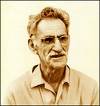Friday, July 21, 2006
Oppen

George Oppen’s name kept on coming up. It took a while before I realised that this was because he’s just had one of those doorstopper complete poems issued by Carcanet. I didn’t know much about Oppen, apart from the fact that he’d given up writing poetry for twenty-odd years, the 40’s and 50’s, then started again without so much as a by-your-leave, and that he’d done this out of leftist political commitment, rather like Mark Stewart of the Pop Group giving up music to go and work for Amnesty. Because of this I’d stupidly imagined his poetry would be dry. I’m starting to realise quite late in life that lots of the things that are commonly supposed to act as dessicants on art (excess of theory, self-reflexivity, political commitment) in fact do nothing of the sort in the majority of cases. Anyway, Oppen was an Objectivist. Objectivism is a development of Imagism. Imagist poets (Pound, HD, Amy Lowell) were interested in cutting away the romantic flab from French Symbolism. They wrote poems of extreme visual clarity, in the belief that the poet’s visual image, conveyed with diamond-hard dry exactness and economy was the way out of the impasse of Romanticism. The emblematic imagist poem is Pound’s ‘In A Station of the Metro’:
The apparition of these faces in the crowd;That’s it. No room for mooning about in ruins or worrying about the past, it’s the twentieth century! Keep up! We’re the European Avant Garde! Objectivism comes soon after. Pound gave it his blessing, but really it’s centred around a few American poets who are all quite a bit younger than him: Louis Zukofsky, Charles Reznikoff, George Oppen, some others. They sought to take the extreme clarity of imagism a step further, to make it even more ‘pure’. Martin Stannard in his now defunct blog compared them to Dexy’s Midnight Runners in their passionate pursuit of committed and severe purity – a type of purity characterised by scepticism, terseness, an attention to the small, and a rigorous structural precision devoid entirely of loyalty to inherited form. This sort of thing is always slightly laughable, and certainly it takes a stern sort of fellow not to find the vast expanse of Louis Zukofsky’s ‘A’ (the ultimate get-around-to-it-one-day book) slightly comical. However, give them a break, try and imagine yourself in the complex 1930’s where the astringency of modernism is at once fresher and more bracing, but also newer and therefore much more fragile, lose-able, and it starts to come alive. A lot begins here. The chance operations of John Cage find themselves prefigured by Zukofsky. I see a lot of Oppen in Prynne. The Black Mountain lot and consequently the British Poetry Revival lot would be very different had these poets not ratcheted up the intellectual rigour in the way they did.
Petals on a wet, black bough.
Intellectual rigour, while not exactly the enemy of fun, certainly doesn’t figure on my list of party must-haves, and yet whilst Oppen ain’t exactly handing out funny hats and hooters, there’s a clear and powerful pleasure to be got from these tough little poems, and this big new Carcanet collected, which to be truthful I bought out of a sense of duty, can actually be read through in a way that some of these new giant tombstones honestly can’t. (I’ve resisted buying the Lee Harwood one – I think of lightness as a central attribute of his poetry and the unwieldyness of the book just doesn’t seem right. I’ll keep looking for the little press editions, thanks). A brief bio? Why not. Born into a wealthy family in New Rochelle NY, and always felt a bit responsible. His poetry often seems to be trying to shrive itself of something, to hand back an unearned share. Actually…I just went over to wikipedia to check something, and their entry on Oppen is pretty much unimpeachable, so if you want to know his life story, look here.
What I want to say, and I’m having to cut this short for time reasons, is that Oppen surprised me by being so lovely. I sort of thought it’d be stern, that it’d be a bit of a slog but good for me in the end. In fact, he’s absolutely bursting with great lines, full of the world, and full of a constantly refrained concern with multitudity (is that a word?) – something more specific than pluralism – an emphatic and lovely insistence that almost the central fact of humanity is numerousness. I’d excerpt some, but I’ve not got the book to hand. I’ll pick a few odd bits out and post them separately. Gotta go…